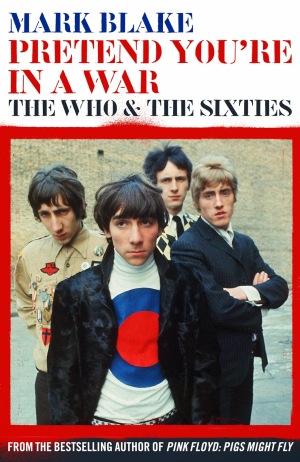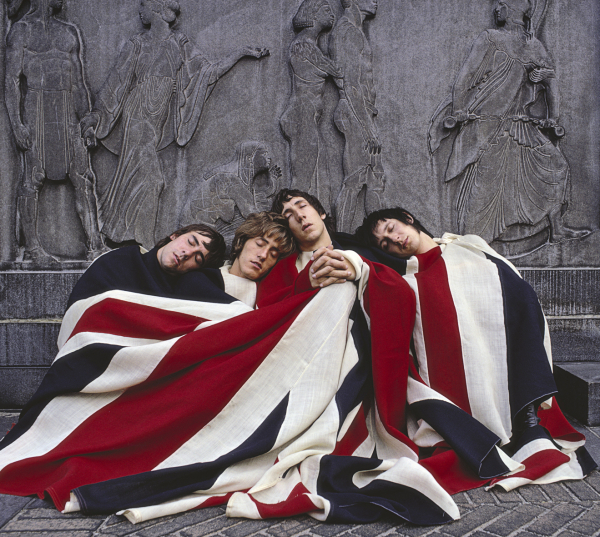 BY JAMIE KNERR As a fan of the Who for 35 years I was sure I’d heard it all: every rock-and-roll excess story, the many sub-plots of internal intrigue, bitterness, rivalries, and self-sabotage, apocryphal tales of every variety, some of which one suspected were at the very least slight exaggerations. Pretend You’re In A War-the Who & the Sixties, a new biography of the band written by Mark Blake, proved me wrong on those accounts. It turns out the stories are by and large true (and corroborated), and the myths that have sprung up over the years often pale by comparison to what apparently really went down.
BY JAMIE KNERR As a fan of the Who for 35 years I was sure I’d heard it all: every rock-and-roll excess story, the many sub-plots of internal intrigue, bitterness, rivalries, and self-sabotage, apocryphal tales of every variety, some of which one suspected were at the very least slight exaggerations. Pretend You’re In A War-the Who & the Sixties, a new biography of the band written by Mark Blake, proved me wrong on those accounts. It turns out the stories are by and large true (and corroborated), and the myths that have sprung up over the years often pale by comparison to what apparently really went down.
Pretend You’re In A War is an exhaustively-researched bio, rich in detail, and a real pleasure for anyone who mistakenly thought, as I did, that they knew all there is to know about The Who. At nearly 400 pages, with a photo section including some rarely-seen pics, this is not an overnight read. At first the narrative establishes a slow rhythm, giving complete accounting of each band member’s childhood and family life, their musical associations prior to joining the  Who, etc. but quickly shifts pace when the forward-thinking entrepreneurial hustlers/pop theorists Kit Lambert and Chris Stamp enter the scene, volunteering their management services.
Who, etc. but quickly shifts pace when the forward-thinking entrepreneurial hustlers/pop theorists Kit Lambert and Chris Stamp enter the scene, volunteering their management services.
We learn about the not-so-subtle machinations of the band and their new management team, as they attempt to brand themselves in a new cultural era, marrying image to music under the heady influence of the Pop Art movement. The Who prove to be deft and even somewhat revolutionary in their approach to breaking into the charts, embracing local fashion trends and symbols in an effort to heighten name-recognition. Their willingness to co-opt iconography and employ shrewd multi-media attacks in marketing shows a group well ahead of it’s time. Townshend openly admits that the Who initially nicked their fashion and outlook from their audience; he credits the early crowds for inspiring not only the music, but particularly the band’s visual presentation. “Faces” was the name given to the real scenesters of the day in Britain, whose clothes, rides, & attitudes dictated Mod-cool in the early/mid-60’s, whom the Who studiously emulated (the source of their first try at a hit single, “I’m the Face”).
The internal strife and personality conflicts that partly defined the band are palpable in many of the quotes from bandmembers . Moon after a gig, fleeing the venue: “I can’t stop, the singer’s trying to kill me…I told him he can’t sing for shit.” Townshend on the key to the band’s success: “If we liked each other we probably wouldn’t exist.” Daltrey: “The Who didn’t really do peace and love.” Pretend You’re In A War follows the band through all its subsequent permutations: finally breaking into the charts in the U.S., the inception and launch of the “Rock Opera” genre, the heyday of 70’s arena rock, the untimely (but hardly surprising) demise of human cannonball/drummer Keith Moon, the struggle to re-form and reclaim the legacy of the band, the sudden (but again, not terribly surprising) passing of bassist John “The Ox” Entwistle.
The book closes with some reflections and musings of the remaining latter-day elder statesmen of rock, trying to make sense of the last 50 years. The disparities between some recollections of the band members is at times amusing. Naturally there’s the obligatory drug and/or alcohol-induced blackouts, fistfights, hotel destruction, sketchy deals and financial mismanagement that one would expect in a bio on The Who. These are hardly minimized, but are given a fuller treatment than you’ll find elsewhere. While those aspects of the band’s history are afforded due attention, they find their proper proportion to the whole story here. At times the pace of the writing seems a bit plodding, particularly in the first act, weighed down under the enormity of it’s own painstaking thoroughness. That’s in no way a detraction though. It’s a dense cake to be sure, best enjoyed one bite at a time. Highly recommended reading.
PREVIOUSLY: All Mods Con

